For the last decade, the browser wars felt… over. Google Chrome won. Most of us just accepted it and moved on. The internet experience became static, predictable.
But now, a new battle is raging, and this time, the weapon of choice is artificial intelligence. I’m talking about the clash between ChatGPT Atlas and Perplexity Comet.
OpenAI, the giant behind ChatGPT, has entered the ring with Atlas. It’s a browser built to act as your personal assistant.
In the other corner is Perplexity AI, a company obsessed with creating a trustworthy “answer engine”. Their browser, Comet, aims to bring clarity and accuracy back to the web.
I spent days living inside these two new browsers. My mission was to cut through the marketing hype. I wanted to find out which of these contenders truly redefines how we use the internet.
Contents
Meet ChatGPT Atlas: Your Personal AI That Does Things
OpenAI’s philosophy with Atlas is simple and bold. They didn’t just add an AI feature to a browser. They built a browser entirely around ChatGPT.
Its core purpose is not to help you find information, but to do things for you. It’s designed to be the ultimate productivity machine, an assistant ready to take action on your command.
This vision rests on three powerful pillars: Chat, Memory, and the game-changing Agent Mode.
Chat, Memory, and Agent Mode
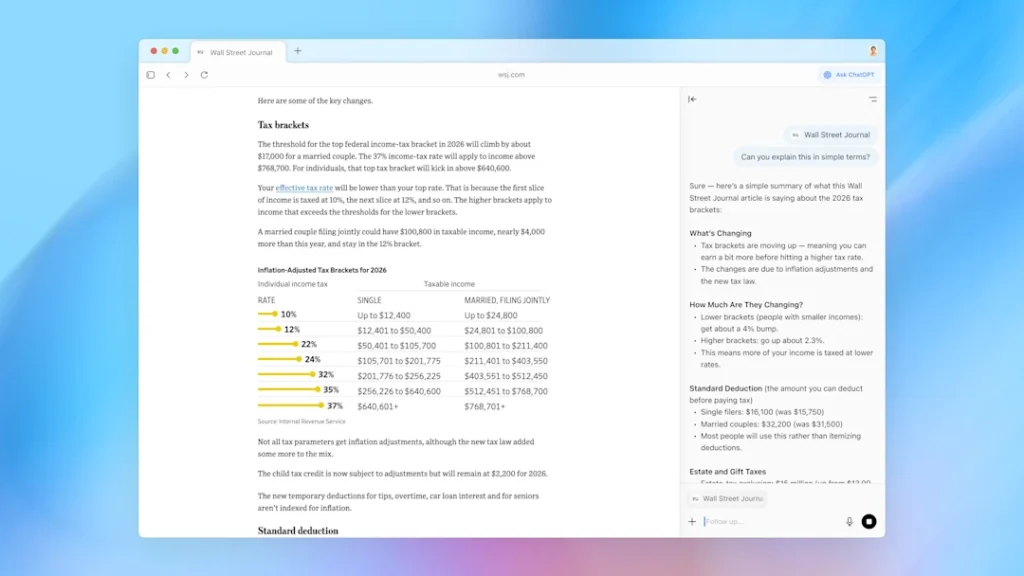
The Chat feature is an ever-present sidebar. No matter what website you’re on, you can summon ChatGPT with a click.
Need a quick summary of a long article? Done. Want to analyze sales data on a webpage? Easy. You can even get help drafting a reply directly inside your Gmail tab, without ever copying and pasting.
A feature called “cursor chat” even lets you highlight text and ask for inline edits on the spot.
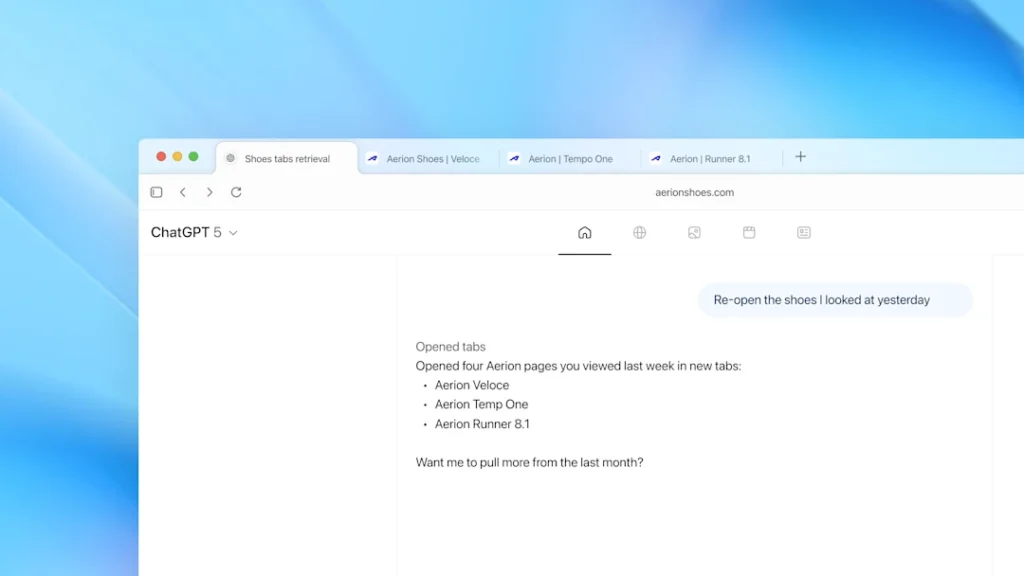
Next is Memory. This optional feature allows Atlas to remember context from sites you visit. It learns your preferences to offer more personalized help over time.
For example, you can ask it to “summarize all the job postings I viewed last week”. OpenAI stresses that you have complete control over these memories and can delete them or browse in incognito mode anytime.
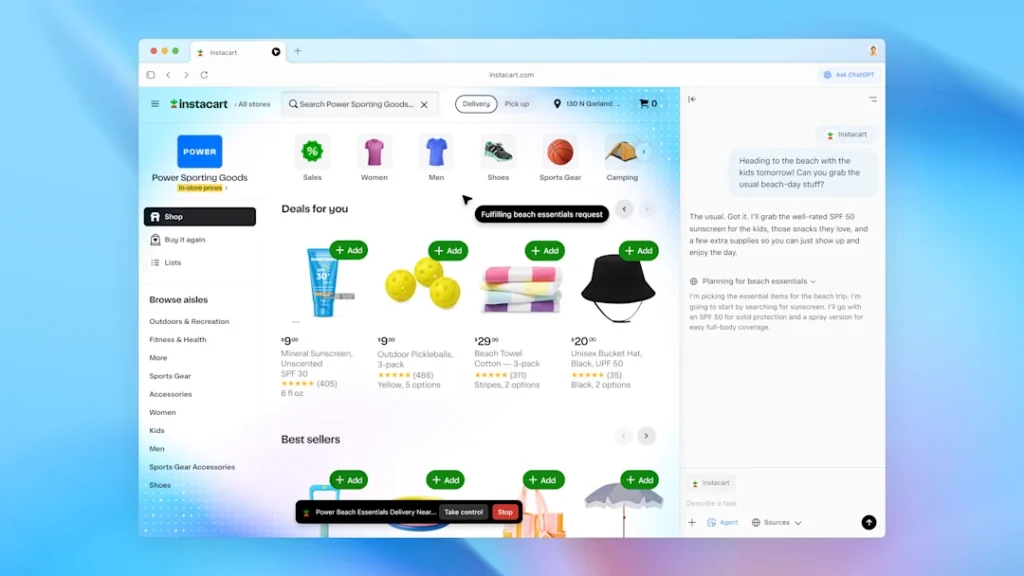
But the main event is Agent Mode. This is the feature that truly defines Atlas. Available exclusively to ChatGPT Plus and Pro subscribers, it transforms the browser into an active assistant. It can execute complex, multi-step tasks on your behalf.
Imagine telling your browser to plan a trip, and watching as it finds flights, compares hotels, and builds an itinerary for you. This is the heart of its agentic browsing capability, turning your requests into completed actions.
For the hundreds of millions of people already using ChatGPT, Atlas feels like a natural and powerful evolution. It closes the gap between asking a question and getting a task done, making it an incredibly compelling tool for anyone focused on productivity.
Meet Perplexity Comet: Your Research Partner That Knows Things
While Atlas wants to be your digital butler, Perplexity Comet wants to be your trusted research partner. It was born from a different philosophy.
Perplexity believes the modern internet is broken, a chaotic mess of SEO spam and sales funnels where reliable information is hard to find. Comet is its answer: a browser designed to deliver knowledge you can actually trust.
Its entire design is built to turn your curiosity into understanding, not just to complete a task.
Accuracy, Citations, and the Comet Assistant
Comet’s standout feature is its commitment to accuracy and citations. Every answer it synthesizes comes with clickable sources, allowing you to instantly verify where the information came from.
This is a direct and powerful solution to the problem of AI “hallucinations,” where chatbots confidently state incorrect facts. It builds a foundation of trust that is often missing in other AI tools.
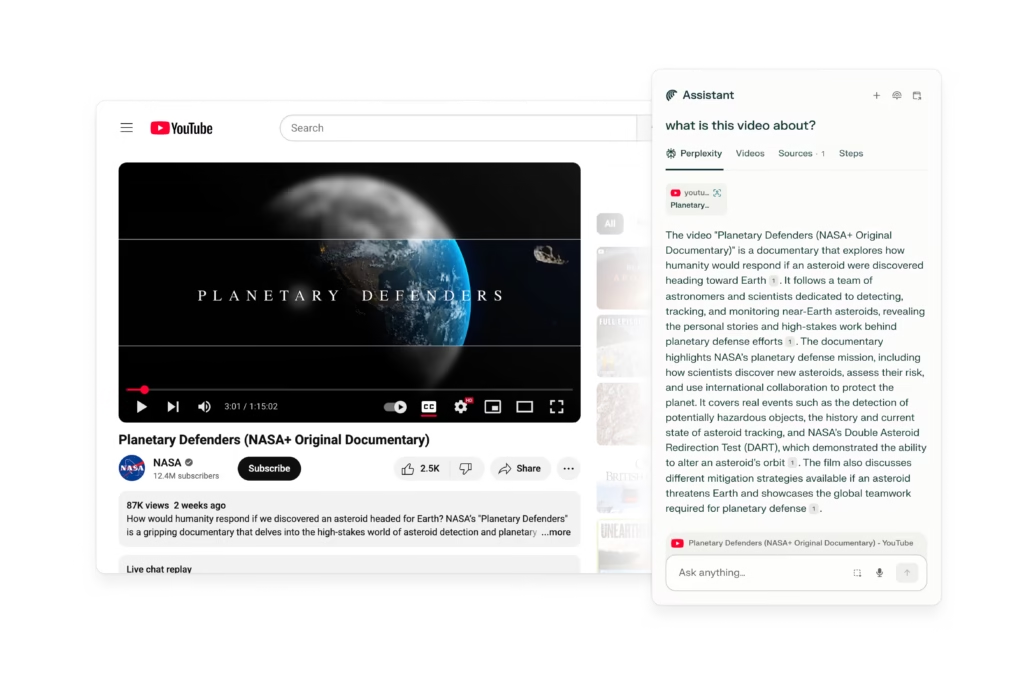
The Comet Assistant is your gateway to this knowledge. It’s always available to answer questions, organize your tabs into neat categories, or even help with tasks like creating a study plan based on a syllabus. It feels less like a separate tool and more like an integrated part of the research process.
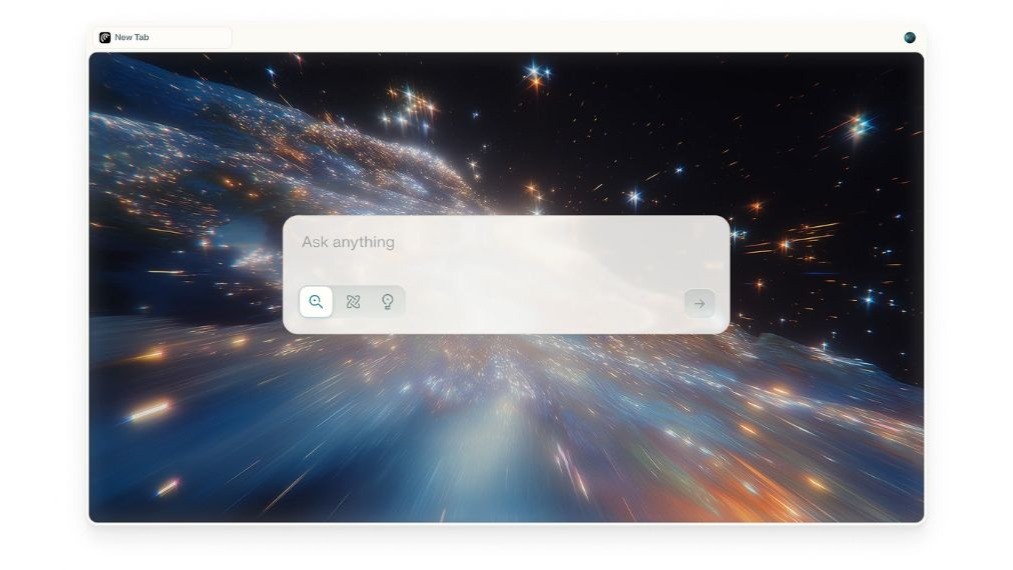
For power users, Comet offers even more. Pro subscribers can access Background Assistants that work on tasks asynchronously.
They also get to choose from a suite of the world’s most powerful AI models, including OpenAI’s GPT-5, Anthropic’s Claude 4, and Google’s Gemini 2.5 Pro. This multi-model approach makes Comet an incredibly versatile AI-powered web browser for tackling any kind of query.
Perplexity argues that before an AI can reliably do things for you, it must first be able to know things accurately. This makes Comet the go-to choice for anyone who values verifiable truth in their work.
Also See: ChatGPT Masterclass: Here Are 21 of the Best Free ChatGPT Courses You Can Take Online
A Head-to-Head Test of ChatGPT Atlas and Perplexity Comet
So, how do these two revolutionary browsers perform in the real world? I put ChatGPT Atlas and Perplexity Comet through a series of tests designed to push their limits and reveal their true strengths.
User Experience and Interface
First, the feel. Both browsers are built on Chromium, so the basic experience of browsing, using extensions, and managing bookmarks is familiar and smooth. The difference is in their AI integration.
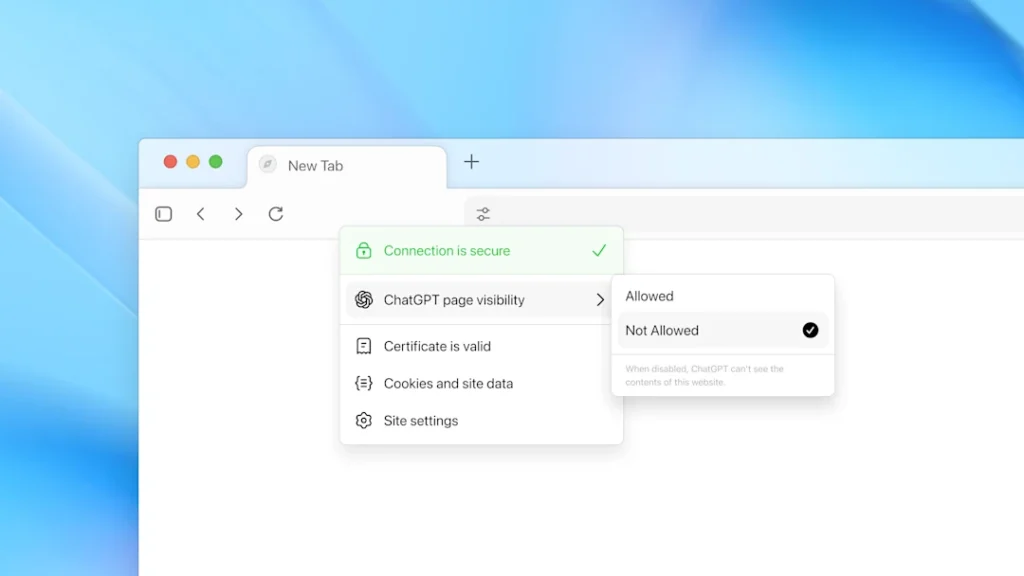
Using Atlas feels like having a constant conversation. The ChatGPT sidebar is your co-pilot, always ready to jump in and help. It’s proactive and built for multitasking.
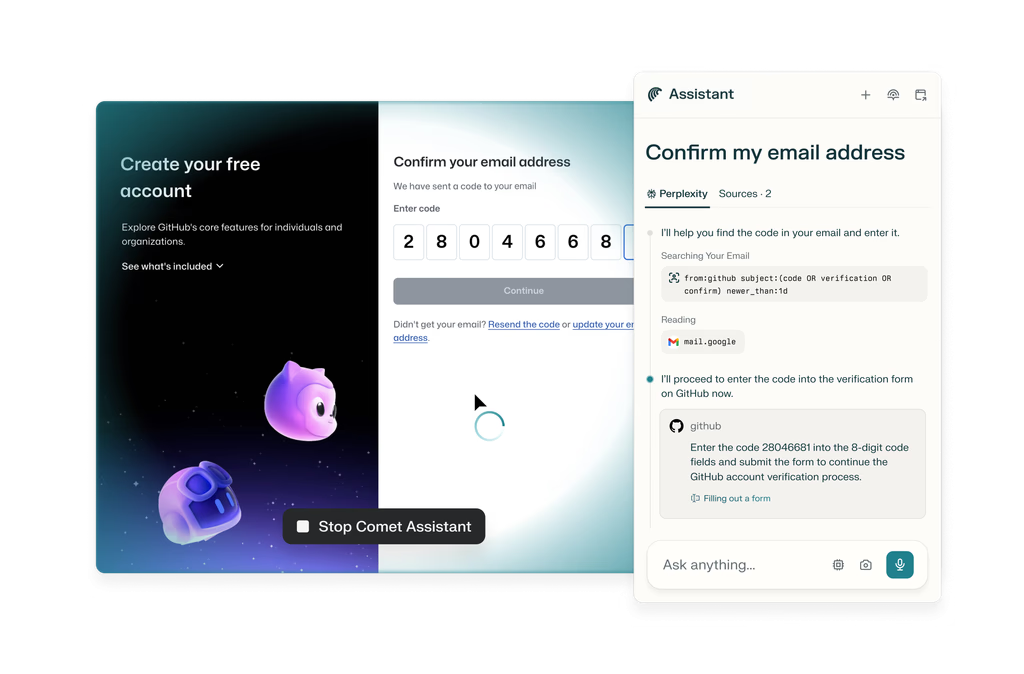
Comet, on the other hand, feels cleaner and more focused. Its AI is seamlessly integrated into the search and address bar, creating a streamlined environment for deep research and learning.
Read: The Ultimate ChatGPT Glossary: 60 Essential AI Terms Everyone Should Know
Scenario 1: The Productivity Gauntlet – Booking a Weekend Trip
To test productivity, I gave both browsers the same task: “Plan a three-day weekend trip to Kyoto in the spring.”
ChatGPT Atlas, using its Agent Mode, was phenomenal. I watched as it opened tabs for flights, compared prices on different hotel booking sites, and even started pulling up popular attractions to build a rough itinerary.
It wasn’t perfect. It needed some guidance, but it automated the most tedious parts of the process. This is agentic browsing in action, and it felt like a glimpse into the future of personal productivity.
Perplexity Comet approached the task differently. It delivered a beautifully synthesized itinerary, complete with cited sources from travel blogs and official tourism sites. It could compare options and answer follow-up questions with incredible accuracy.
However, it couldn’t take the next step of actually booking the flights or hotel for me. It gave me the knowledge, but I had to take the action.
Scenario 2: The Research Challenge – AI Ethics Paper
Next, I tasked them with helping me write a research paper on the ethical implications of AI.
Here, Perplexity Comet was in a league of its own. It scanned dozens of academic papers and news articles, synthesizing the key arguments and providing perfectly formatted citations for every claim. It helped me identify counterarguments and explore tangential ideas without ever losing context. The ability to trust its sources was a massive advantage for serious academic work.
ChatGPT Atlas was helpful for brainstorming and refining my writing. Its inline editing suggestions were great for improving sentence structure and tone. However, when it came to factual accuracy and sourcing, it couldn’t match Comet’s rigor. I had to spend extra time double-checking its claims, which slowed down the research process.
Trust, Cost, and Accessibility
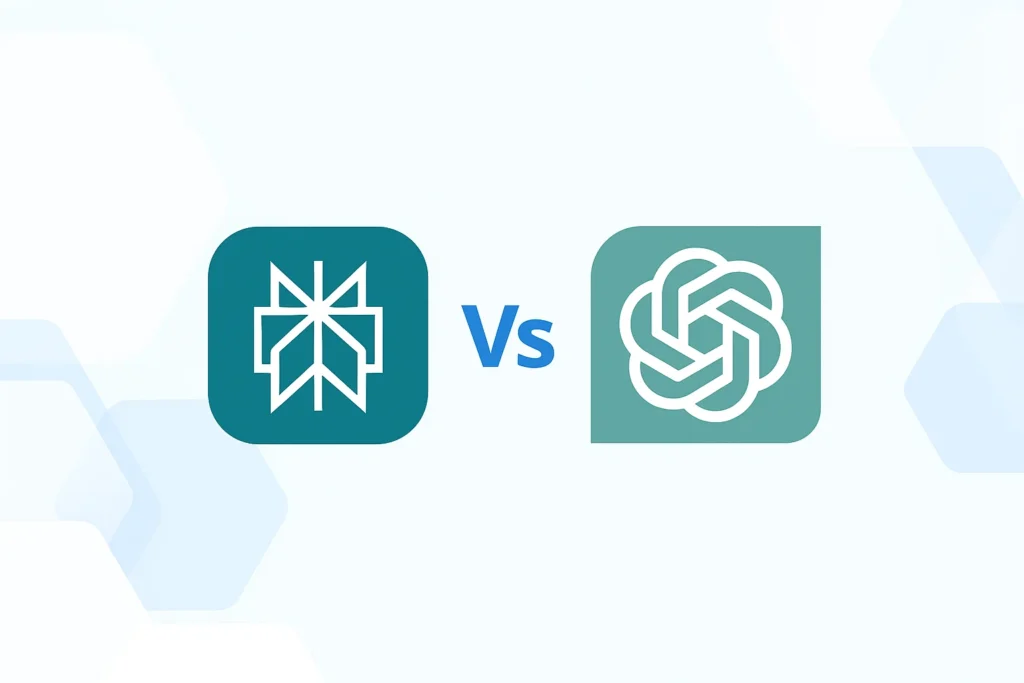
Cost is another major differentiator. Perplexity made Comet’s core features free for everyone, which is a huge win for users.
You can experience its power without paying a dime. In stark contrast, the most compelling feature of ChatGPT Atlas, Agent Mode, is locked behind a $20 per month ChatGPT Plus subscription. Furthermore, Atlas launched on macOS only, while Comet has wider availability.
OpenAI ChatGPT Atlas
Perplexity Comet
Core Philosophy
The AI Agent (A “Doer”)
The Knowledge Synthesizer (A “Knower”)
Best For
Productivity, task automation, content creation
Research, fact-checking, deep analysis
Standout Feature
Agent Mode (Executes multi-step tasks)
Cited Answers (Verifiable sources for trust)
Pricing Model
Free tier with Agent Mode paywalled ($20/mo)
Generous free tier, Pro plan for more models
Key Differentiator
Seamless integration for existing ChatGPT users
Unmatched accuracy and source transparency
And the Real Winner Is…
After days of intensive testing, it’s clear that the battle between ChatGPT Atlas and Perplexity Comet doesn’t have a single winner.
That’s because they aren’t really competing for the same user. They are pioneering two different paths for the future of the internet, each serving a distinct type of person.
The Winner for the Busy Professional: ChatGPT Atlas
If your day is filled with digital tasks, like answering emails, managing projects, booking meetings, or shopping online, ChatGPT Atlas is your champion. It is designed to save you time and clicks by automating the tedious parts of your workflow.
For content creators, marketers, and managers who already rely on ChatGPT, Atlas is an indispensable tool that transforms conversation into action. It is the superior AI-powered web browser for getting things done.
Related: Use ChatGPT at Work? These 10 Prompts Will Boost Your Productivity and Make You Look Like a Genius
The Winner for the Curious Mind: Perplexity Comet
If your work depends on accuracy, deep understanding, and verifiable facts, Perplexity Comet is the undisputed winner. It is the perfect companion for students, academics, journalists, and researchers.
Its ability to synthesize complex information from credible sources makes it an unparalleled tool for anyone who needs to learn and think critically. When truth matters more than speed, Comet delivers with confidence.
Ultimately, the real winner in the showdown between ChatGPT Atlas and Perplexity Comet is all of us. After years of stagnation, true innovation is finally returning to the web browser. This fierce competition is pushing the boundaries of what an AI-powered web browser can be, making our digital lives smarter and more efficient.
The era of passive browsing is over. The future of agentic browsing has arrived, and it is incredibly exciting.